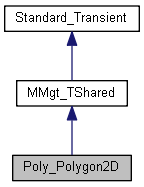Provides a polygon in 2D space (for example, in the parametric space of a surface). It is generally an approximate representation of a curve. A Polygon2D is defined by a table of nodes. Each node is a 2D point. If the polygon is closed, the point of closure is repeated at the end of the table of nodes. More...
#include <Poly_Polygon2D.hxx>

Public Member Functions | |
| Poly_Polygon2D (const TColgp_Array1OfPnt2d &Nodes) | |
| Constructs a 2D polygon defined by the table of points, <Nodes>. More... | |
| Standard_Real | Deflection () const |
| Returns the deflection of this polygon. Deflection is used in cases where the polygon is an approximate representation of a curve. Deflection represents the maximum distance permitted between any point on the curve and the corresponding point on the polygon. By default the deflection value is equal to 0. An algorithm using this 2D polygon with a deflection value equal to 0 considers that it is working with a true polygon and not with an approximate representation of a curve. The Deflection function is used to modify the deflection value of this polygon. The deflection value can be used by any algorithm working with 2D polygons. For example: More... | |
| void | Deflection (const Standard_Real D) |
| Sets the deflection of this polygon to D. More... | |
| Standard_Integer | NbNodes () const |
| Returns the number of nodes in this polygon. Note: If the polygon is closed, the point of closure is repeated at the end of its table of nodes. Thus, on a closed triangle, the function NbNodes returns 4. More... | |
| const TColgp_Array1OfPnt2d & | Nodes () const |
| Returns the table of nodes for this polygon. More... | |
 Public Member Functions inherited from MMgt_TShared Public Member Functions inherited from MMgt_TShared | |
| virtual void | Delete () const |
| Memory deallocator for transient classes. More... | |
 Public Member Functions inherited from Standard_Transient Public Member Functions inherited from Standard_Transient | |
| Standard_Transient () | |
| Empty constructor. More... | |
| Standard_Transient (const Standard_Transient &) | |
| Copy constructor – does nothing. More... | |
| Standard_Transient & | operator= (const Standard_Transient &) |
| Assignment operator, needed to avoid copying reference counter. More... | |
| virtual | ~Standard_Transient () |
| Destructor must be virtual. More... | |
| virtual const Handle_Standard_Type & | DynamicType () const |
| Returns a type information object about this object. More... | |
| Standard_Boolean | IsInstance (const Handle_Standard_Type &theType) const |
| Returns a true value if this is an instance of Type. More... | |
| Standard_Boolean | IsInstance (const Standard_CString theTypeName) const |
| Returns a true value if this is an instance of TypeName. More... | |
| Standard_Boolean | IsKind (const Handle_Standard_Type &theType) const |
| Returns true if this is an instance of Type or an instance of any class that inherits from Type. Note that multiple inheritance is not supported by OCCT RTTI mechanism. More... | |
| Standard_Boolean | IsKind (const Standard_CString theTypeName) const |
| Returns true if this is an instance of TypeName or an instance of any class that inherits from TypeName. Note that multiple inheritance is not supported by OCCT RTTI mechanism. More... | |
| virtual Handle_Standard_Transient | This () const |
| Returns a Handle which references this object. Must never be called to objects created in stack. More... | |
| Standard_Integer | GetRefCount () const |
| Get the reference counter of this object. More... | |
Detailed Description
Provides a polygon in 2D space (for example, in the parametric space of a surface). It is generally an approximate representation of a curve. A Polygon2D is defined by a table of nodes. Each node is a 2D point. If the polygon is closed, the point of closure is repeated at the end of the table of nodes.
Constructor & Destructor Documentation
| Poly_Polygon2D::Poly_Polygon2D | ( | const TColgp_Array1OfPnt2d & | Nodes | ) |
Constructs a 2D polygon defined by the table of points, <Nodes>.
Member Function Documentation
| Standard_Real Poly_Polygon2D::Deflection | ( | ) | const |
Returns the deflection of this polygon. Deflection is used in cases where the polygon is an approximate representation of a curve. Deflection represents the maximum distance permitted between any point on the curve and the corresponding point on the polygon. By default the deflection value is equal to 0. An algorithm using this 2D polygon with a deflection value equal to 0 considers that it is working with a true polygon and not with an approximate representation of a curve. The Deflection function is used to modify the deflection value of this polygon. The deflection value can be used by any algorithm working with 2D polygons. For example:
- An algorithm may use a unique deflection value for all its polygons. In this case it is not necessary to use the Deflection function.
- Or an algorithm may want to attach a different deflection to each polygon. In this case, the Deflection function is used to set a value on each polygon, and later to fetch the value.
| void Poly_Polygon2D::Deflection | ( | const Standard_Real | D | ) |
Sets the deflection of this polygon to D.
| Standard_Integer Poly_Polygon2D::NbNodes | ( | ) | const |
Returns the number of nodes in this polygon. Note: If the polygon is closed, the point of closure is repeated at the end of its table of nodes. Thus, on a closed triangle, the function NbNodes returns 4.
| const TColgp_Array1OfPnt2d& Poly_Polygon2D::Nodes | ( | ) | const |
Returns the table of nodes for this polygon.
The documentation for this class was generated from the following file:
 1.8.5
1.8.5